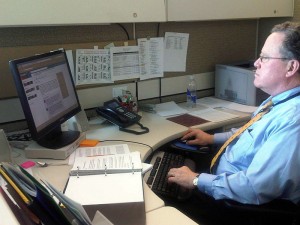Employers Comb Social Media Sites for Prospective Employees
by Anthony Smith | October 3, 2012 3:09 pm
By ANTHONY SMITH
 [1]
[1]As Ramapo students get closer to graduation, the prospect of finding a full-time job will become an ever-growing burden on them.
Social media becoming more popular by the second, employers are going to Facebook and other sites to conduct background checks on prospective employees. The Ponemon Institute, a research institution that focuses on security and privacy information, conducted a survey that found that 23 percent of hiring managers look up people of Facebook, with about one-third of those resulting in rejections.
However, according to The National Association of Colleges and Employers, “Employers expect to hire 13 percent more new college graduates from the Class of 2013 than they did from the Class of 2012.” With hiring of recent college graduates on the rise, it has never been more important to keep a clean image on the web.
Brad Entrup, Ramapo junior, is one student who thinks being cautious of what is on the internet about him is the right thing to do. “I work in a professional environment and don’t want anything distasteful being on my page or associated with me,” Entrup said.
A Forbes report stated that “Like it or not, Facebook and other sites like it are becoming the digital proxies for our real world selves.”
Ramapo Junior Brian Ooms thinks keeping a clean image is on Facebook is important for his future, also.
“I try to be careful of what I post on Facebook,” Ooms said. “Jobs are starting to look on Facebook pages to really find out what type of person they’re hiring.”
Ooms also think that it’s important for people to tell their friends that they don’t want any questionable content about the posted on the internet.
“If it’s something that I don’t want posted on Facebook by a friend then I just tell them, again for the same reason. It’s important to keep a clean image,” Ooms said.
Dr. Eileen Quaglino, career adviser at the Cahill Center at Ramapo College, says that the type of behavior displayed by Entrup and Ooms is exemplary in today’s world.
“If [employers] do see something on Facebook that is inappropriate, someone has a picture of a drink in their hand, or is scandally dressed, if they post that kind of behavior and an employer sees, it the employer is immediately going to disqualify that person from the position,” Quaglino said.
A 2007 MSNBC report said that “Facebook users often don’t expect their personal information to be monitored by potential employers, and many consider their online profile information to be private.” But Quaglino says that there are now issues arising exposing that this may not be the case.
“Employers are trying to use social media to check out applicants,” Quaglino said. “There is a big controvery right now whether it is legal or not for an employer to get a Facebook password or a LinkedIn password [of a potential employee] so that they can actually go in and look at their Facebook account and LinkedIn account, and my opinion is that it should be illegal.”
According to Facebook, there are over 955 million users worldwide, as of June 2012. Swiss-based work force consulting firm Adecco found that 66 percent of people on Facebook were in their late teens or early 20s, a ripe age for searching for a job. However, 56 percent of people within the study agreed with Quaglino, and said that it is unfair for employers to search for them on Facebook
A March 2012 Forbes report also found ethical issues with Facebook searching for future employees.
“Employers can discriminate against potential employees who seem like bummers based on their Wall postings and interests,” the report said, adding that employers will “get into trouble if what the Facebook user has said about their religious views affects the hiring process.”
Dr. Quaglino also finds many ethical issues with employers using personal information to get an inside look on prospective employees.
“Number one, its private information. Number two, some of them have actually threatened to not hire people or to let people go if they do not share that information. I think that’s very wrong. The other issue with Facebook especially, I warn students to be very careful because once its on the internet, even though you can take it down, it’s there forever. Someone who knows what their doing will find it.”
Regardless of the ethical issues behind employers searching their employees via social media, there are no laws that make it illegal. Because of this, Adecco has offered advice to assist students in the matter.
“Clean up your social media sites and be prepared for someone checking up on what you have put out onto the web. Make sure it doesn’t contain anything you wouldn’t want a potential employer knowing about you.”
- [Image]: http://class1.ramaporecord.org/2012/10/03/employers-comb-social-media-sites-for-prospective-employees/acting_assistant_secretary_robinson_participates_in_a_live_facebook_chat_6755716727/
Source URL: https://class1.ramaporecord.org/?p=8445